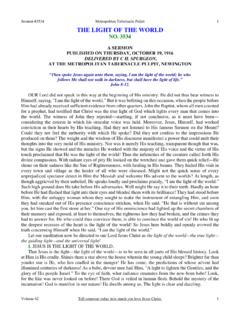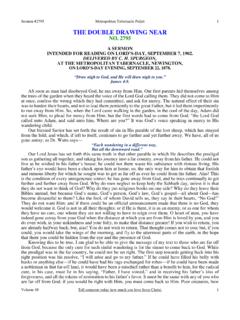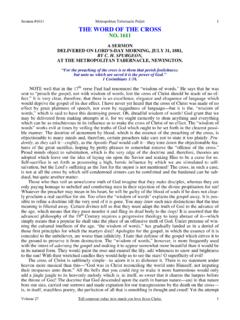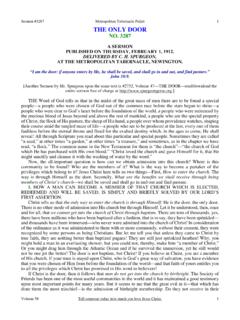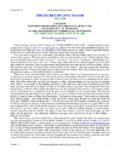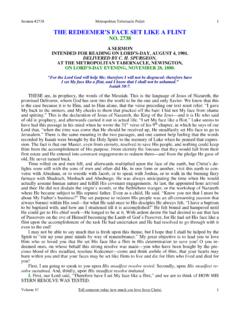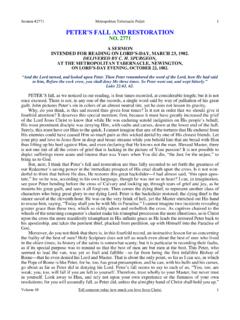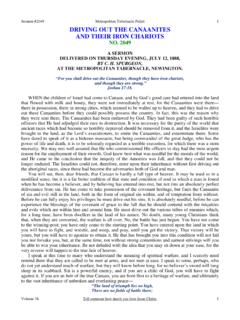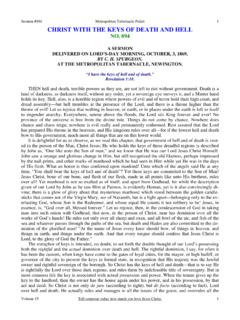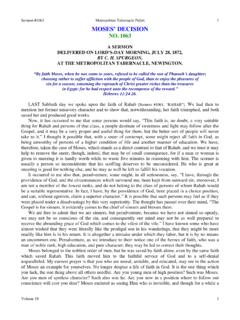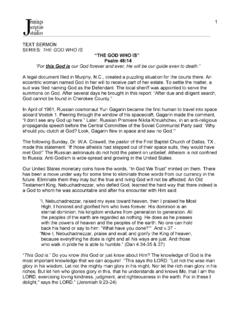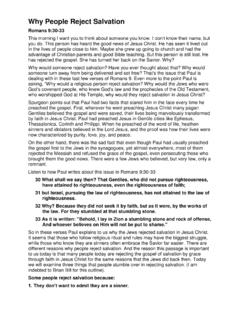Transcription of Sermon #207 The New Park Street Pulpit 1 …
1 Sermon #207 The New Park Street Pulpit 1 Volume 4 1 SOVEREIGN grace AND MAN S RESPONSIBILITY NO. 207 A Sermon DELIVERED ON SABBATH MORNING, AUGUST 1, 1858, BY THE REV. C. H. SPURGEON, AT THE MUSIC HALL, ROYAL SURREY GARDENS. But Isaiah is very bold, and says, I was found of them that sought me not; I was made manifest unto them that asked not after me. But to Israel he says, All day long I have stretched forth my hands unto a disobedient and gainsaying people. Romans 10:20-21. DOUBTLESS these words primarily refer to the casting away of the Jews and to the choosing of the Gentiles. The Gentiles were a people who sought not after God, but lived in idolatry. Nevertheless, JEHOVAH was pleased in these latter times to send the Gospel of His grace to them, while the Jews who had long enjoyed the privileges of the Word of God, on account of their disobedience and rebellion were cast away.
2 I believe, however, that while this is the primary object of the words of our text, yet as Calvin says, the truth taught in the text is a type of a universal fact. As God did choose the people who knew Him not, so has He chosen, in the abundance of His grace , to manifest His salvation to men who are out of the way, while, on the other hand, the men who are lost, after having heard the Word, are lost because of their willful sin. For God does all the day long stretch forth His hands unto a disobedient and gainsaying people. The system of truth is not one straight line, but two. No man will ever get a right view of the Gospel until he knows how to look at the two lines at once. I am taught in one book to believe that what I sow, I shall reap. I am taught in another place that, It is not of him who wills nor of him who runs, but of God who shows mercy.
3 I see in one place God presiding over all in providence. And yet I see, and I cannot help seeing, that man acts as he pleases and that God has left his actions to his own will, in a great measure. Now, if I were to declare that man was so free to act that there was no providence of God over his actions, I would be driven very near to Atheism. And if, on the other hand, I declare that God so overrules all things, as that man is not free enough to be responsible, I am driven at once into Antinomianism or fatalism. That God predestines and that man is responsible are two things that few can see. They are believed to be inconsistent and contradictory, but they are not. It is the fault of our own weak judgment.
4 Two truths of God cannot be contradictory to each other. If, then, I find taught in one place that everything is fore-ordained, that is true. And if I find in another place that man is responsible for all his actions, that is true. And it is my folly that leads me to imagine that two truths can ever contradict each other. These two truths, I do not believe, can ever be welded into one upon any human anvil, but one they shall be in eternity. They are two lines that are so nearly parallel that the mind that shall pursue them farthest will never discover that they converge, but they do converge and they will meet somewhere in eternity, close to the throne of God, whence all truth does spring. Now, this morning I am about to consider the two doctrines.
5 In the twentieth verse, we have taught us the doctrines of sovereign grace , But Isaiah is very bold, and says, I was found of them that sought me not; I was made manifest unto them that asked not after me. In the next verse, we have the doctrine of man s guilt in rejecting God. To Israel he says, All day long I have stretched forth my hands unto a disobedient and gainsaying people. I. First, then, DIVINE SOVEREIGNTY AS EXEMPLIFIED IN SALVATION. Sovereign grace and Man s Responsibility Sermon #207 Volume 4 2 2 If any man be saved, he is saved by divine grace and by divine grace alone. The reason of his salvation is not to be found in him, but in God. We are not saved as the result of anything that we do or that we will, but we will and do as the result of God s good pleasure and the work of His grace in our hearts.
6 No sinner can prevent God, that is, he cannot go before Him, cannot anticipate Him. God is always first in the matter of salvation. He is before our convictions, before our desires, before our fears, before our hopes. All that is good or ever will be good in us is preceded by the grace of God and is the effect of a divine cause within. Now, in speaking of God s gracious acts of salvation this morning, I notice, first, that they are entirely unmerited. You will see that the people here mentioned certainly did not merit God s grace . They found Him, but they never sought Him. He was made manifest to them, but they never asked for Him. There was never a man saved who merited it. Ask all the saints of God and they will tell you that their former life was spent in the lusts of the flesh, that in the days of their ignorance, they revolted against God and turned back from His ways, that when they were invited to come to Him, they despised the invitation and when warned, cast the warning behind their back.
7 They will tell you that their being drawn by God was not the result of any merit before conversion, for some of them, as far from having any merit, were the very vilest of the vile. They plunged into the very kennel of sin. They were not ashamed of all the things of which it would be a shame for us to speak. They were ringleaders in crime, very princes in the ranks of the enemy. And yet sovereign grace came to them and they were brought to know the Lord. They will tell you that it was not the result of anything good in their disposition, for although they trust that there is now something excellent implanted in them, yet in the days of their flesh they could not see one quality which was not perverted to the service of Satan. Ask them whether they think they were chosen of God because of their courage, they will tell you, no.
8 If they had courage, it was defaced, for they were courageous to do evil. Question them whether they were chosen of God because of their talent, they will tell you, no, they had talent, but they prostituted it to the service of Satan. Question them whether they were chosen because of the openness and generosity of their disposition. They will tell you that that very openness of temper and that very generosity of disposition led them to plunge deeper into the depths of sin, than they otherwise would have done, for they were, Hail fellow, well met, with every evil man and ready to drink and join every jovial party which came their way. There was in them no reason whatever why God should have mercy upon them, and the wonder to them is that He did not cut them down in the midst of their sins, blot out their names from the book of life and sweep them into the gulf where the fire burns that shall devour the wicked.
9 But some have said that God chooses His people because He foresees that after He chooses them, they will do this, that, and the other, which shall be meritorious and excellent. Refer again to the people of God and they will tell you that since their conversion they have had much to weep over. Although they can rejoice that God has begun the good work in them, they often tremble lest it should not be God s work at all. They will tell you that if they are abundant in faith, yet there are times when they are superabundant in unbelief. If sometimes they are full of works of holiness, yet there are times when they weep many tears to think that those very acts of holiness were stained with sin. The Christian will tell you that he weeps over his very tears.
10 He feels that there is filth even in the best of desires, that he has to pray to God to forgive his prayers, for there is sin in the midst of his supplications, and that he has to sprinkle even his best offerings with the atoning blood, for he never can bring an offering without spot or blemish. You shall appeal to the brightest saint, to the man whose presence in the midst of society is like the presence of an angel, and he will tell you that he is still ashamed of himself. Ah! he will say, you may praise me, but I cannot praise myself. You speak well of me, you applaud me, but if you knew my heart, you would see abundant reason to think of me as a poor sinner saved by grace , who has nothing Sermon #207 Sovereign grace and Man s Responsibility Volume 4 3 3 whereof to glory and must bow his head and confess his iniquities in the sight of God.
